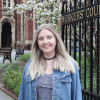
Alex Gray
- Course: BA Politics and Parliamentary Studies
- Nationality: British
What made you want to apply to your course and to Leeds?
Since the first open day that I visited Leeds, I knew I wanted to study here. I thought the campus environment in a big city was special and different to other universities that I looked around. The parliamentary pathway aspect of the Politics degree course really stood out for me. Since I started studying Politics as an A-Level at school I thought the idea of working at the centre of British politics would be an experience like no other—I was not wrong.What is it that makes you passionate about your area of study?
When I say I study politics at university people’s reaction is usually “Why?!” or “Do you want to be an MP then?” In my view politics is everything, it affects all of us in ways we do not even realise and learning about how power relations work around the world is so interesting and important. Another reason is that my course relates to stories that are on the news everyday and my degree course helps me understand current affairs.Please tell us about your experience on your course
I have loved studying Politics and Parliamentary Studies at Leeds. The course is very engaging and I am pleased with the level of choice I had when picking modules and my dissertation topic. The placement in my third year has given me the insight and skills needed to find employment after I graduate. I spent half the year in Canada living and studying at Carleton University, whilst also campaigning in their Federal Election, then working in Parliament for an MP. When I moved back to the UK and started work in London I was sufficiently prepared for the high-pressure working environment in Westminster. I gained invaluable skills in communication, organisation, working under pressure and writing. These skills, along with the connections I made whilst working in Parliament, will help me massively after I graduate.Tell us more about your parliamentary placement
I worked for Mary Creagh MP in Parliament between January and May 2016 for my placement. My tasks were very varied in Mary’s office. When I started working I did relatively simple tasks such as making Mary’s “day pack”. This included her diary for the day and the week, information about meetings she was attending, relevant policy notes on debates happening in the chamber that day and a highlighted media pack of the most important news of the day. I would then give this to her ready for our team meeting at 9.30am when she arrived in the office.My main duties on a regular day were to answer the phone, sort out her email inbox and reply or flag-up important emails. If she was having guests and meetings I would meet them at the entrance and bring them up to the office. I also gave tours to constituents that were visiting from Wakefield. One of my main tasks from the first week was to write the weekly newsletter, I also wrote all of the website posts and contributed to social media posts. When Mary was appearing on TV or radio, we would create a briefing pack with the main issues of the week make sure she was ready to answer any questions.
The highlight of my placement was just being in the hub of British politics. It was fascinating to be working in a place I had learnt so much about in my degree. Everyday we would sit next to a famous politician or news reporter at lunch, once it was David Cameron when he was Prime Minister.
I have learned to work in Parliament you need to be adaptable and willing to handle anything that comes your way. Halfway through my placement, Mary’s office manager went on secondment so I took up this role. This included organising all of Mary’s meetings and appointments, organising travel and responding to invites. I was glad I was trusted to step into this senior role and it shows that this work environment in very unpredictable and you do not know what you’ll be doing one day to the next.
How do you think your placement has helped your personal development?
I am much more confident in my abilities now than I was before I lived and worked in Canada and London. I have learnt to communicate with people of all different ages and professions and I am so much more willing to engage with people at university I wouldn’t have done before.What would you say about the learning facilities in the School and at the University in general?
I have found the teaching in POLIS to be of a high standard. The academics that teach us have usually undertaken research in that area so truly are experts in their particular field. The new Laidlaw Library and newly refurbished Edward Boyle Library are great places to study and conduct research for my dissertation and contain all the resources I need.

